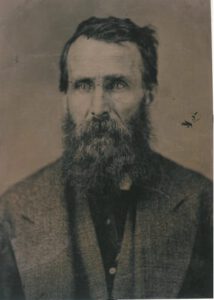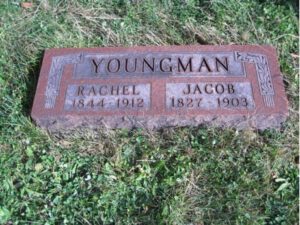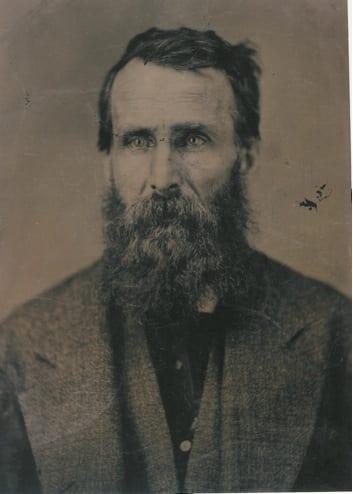During the series Finding Your Roots with Henry Louis Gates, Jr. on PBS, The Blog featured posts from 23andMe’s Ancestry Ambassadors. This is the last of their own stories about using DNA to dig into ancestry.
By Tim Janzen, M.D.
For over 30 years I have been trying to determine the ancestry of my great-great-great-grandfather Jacob Youngman (b. ca Aug 1823, d. 24 May 1903).
 Jacob Youngman
Jacob Youngman
I used traditional genealogical research techniques for much of that time, but not long ago I realized that DNA testing at 23andMe could help me solve this decades old puzzle. No one in our family knew who Jacob Youngman’s parents were, but his son Charles Youngman (b. 1872) left a tantalizing clue in his autobiographical sketch that was published in the book “History of Harrison County, Missouri.”
Charles Youngman said that Jacob Youngman’s father lived in Kentucky, moved first to Indiana, and later settled in central Missouri where he died. Not too many Youngmans fit this description. In the past two years, I have developed a theory that Jacob Youngman’s father was John Youngman (b. ca 1793), who is listed in the 1840 Census in Clay County, Missouri but is not listed there in the 1850 Census.
I know that my ancestor Jacob Youngman is listed in Shelby Co., Indiana in the 1850 Census but the man I presume to be his father, John Youngman isn’t. Instead, I recently discovered that John Youngman didn’t die prior to 1850, but instead moved to Denton Co., Texas where he is listed in the 1850 Census with his younger children.
This genealogical puzzle is
complicated by the fact that John Youngman was married 3 times and was divorced from his second wife Elizabeth Reeves, his first wife had apparently died by 1822.
 Photograph of the gravestone of Jacob Youngman (b. ca Aug 1823) and his second wife Rachel Cart.
Photograph of the gravestone of Jacob Youngman (b. ca Aug 1823) and his second wife Rachel Cart.
Census records from 1820, 1830, and 1840 indicate that he had children by all three wives, but only his 5 youngest children who were living with him in 1850 are named in the census records.
Another clue is that Jacob Youngman’s granddaughter Louise Youngman (1893-1988) said that her grandfather often referred to “Uncle Stacy Reeves”, suggesting that Jacob Youngman’s mother could have been Elizabeth Reeves, the second wife of John Youngman. A Stacy T. Reeves (b. ca 1823) is listed near Jacob Youngman and his family in the 1860 Census and may be the “Uncle Stacy Reeves” that Louise Youngman was referring to. By the fall of 2010 I had many promising hints, but I still hadn’t solved the puzzle and then I established contact with several other Youngman researchers, Debbi Youngman and Susie Brewer. Both are related to descendents of John Youngman by his first and third wives. I decided to pursue confirmation of my theory that Jacob Youngman was a son of John Youngman by his second wife Elizabeth Reeves through autosomal DNA testing done by 23andMe. Troy McCoy, a great-grandson of John Youngman and his third wife, was the person most closely related to John Youngman who was tested. Below is a summary of the DNA data showing the amount of autosomal DNA in centimorgans (cMs) that Troy McCoy shares in common with each of the five great-grandchildren of Jacob Youngman who have been tested by 23andMe. The comparison between Troy McCoy and Jacob Youngman’s great-grandchildren is the most important because in theory they should share the most autosomal DNA in common since they are the most closely related among all of the Youngman descendents in the project. A centimorgan is a unit of crossover frequency used to measure how often DNA segments are split up by recombination as they pass through the generations. The proper way to analyze this data is to create an average of the amount of DNA shared between Troy McCoy and Jacob Youngman’s five great-grandchildren. (See table 1.)
John Youngman and Family Reconstructed
John Youngman (b. ca 1793 in Kentucky) married his first wife Elizabeth Marton (b. ca 1798 in Kentucky) on 23 Feb 1816 in Campbell Co., Kentucky. Elizabeth Marton appears to have died ca 1821. John and Elizabeth had three children:
1. John M. Youngman (b. 10 Jan 1818 in Kentucky)
2. William Youngman (b. ca 1818 in Kentucky)
3. Susanna Youngman (b. ca 1821 in Kentucky)
John Youngman (b. ca 1793) married his second wife Elizabeth Reeves (b. ca 1802 in Kentucky) on 20 Jul 1822 in Campbell Co., Kentucky. They were divorced on 29 Apr 1830. They had two children:
1. Jacob Youngman (b. ca 1823, KY)
2. Unknown female (b. ca 1825-30)
John Youngman (b. ca 1793) married his third wife Priscilla Clark on 10 Jun 1830 in Clermont Co., Ohio. They had seven children:
1. Sarah A. Youngman (b. ca 1830, IN)
2. Nancy Catherine Youngman (b. ca 1832,IN)
3. James C. Youngman (b. ca 1835, IN)
4. Mary Jane Youngman (b. 1835, IN)
5. Louhany Youngman (b. 1843, MO)
6. Thomas Jefferson Youngman (b. 1844, AR)
7. Joseph Youngman (b. ca 1844, AR)
It is reasonable to assume that all of the matching segments over 5 cMs in length came from a shared common ancestor. A threshold of around 4 to 5 cMs is necessary since it is common for random people of European ancestry to share segments that are less than 4 cMs in length even if they don’t have any ancestry in common in the past 300 years. We would expect that on average half third cousins should share about 27.8 cMs of DNA. The above averages support of my theory that Troy McCoy’s great-grandmother Mary Jane Youngman (b. ca 1836) was a half sibling to my great-great-great-grandfather Jacob Youngman (b. ca Aug 1823).
It is reasonable to assume that all of the matching segments over 5 cMs in length came from a shared common ancestor. A threshold of around 4 to 5 cMs is necessary since it is common for random people of European ancestry to share segments that are less than 4 cMs in length even if they don’t have any ancestry in common in the past 300 years. We would expect that on average half third cousins should share about 27.8 cMs of DNA. The above averages support of my theory that Troy McCoy’s great-grandmother Mary Jane Youngman (b. ca 1836) was a half sibling to my great-great-great-grandfather Jacob Youngman (b. ca Aug 1823).
A Stacy T. Reeves (b. ca 1823) is listed near Jacob Youngman and his family in the 1860 Census and may be the “Uncle Stacy Reeves” that Louise Youngman was referring to. By the fall of 2010 I had many promising hints, but I still hadn’t solved the puzzle and then I established contact with several other Youngman researchers, Debbi Youngman and Susie Brewer. Both are related to descendents of John Youngman by his first and third wives. I decided to pursue confirmation of my theory that Jacob Youngman was a son of John Youngman by his second wife Elizabeth Reeves through autosomal DNA testing done by 23andMe. Troy McCoy, a great-grandson of John Youngman and his third wife, was the person most closely related to John Youngman who was tested.
Below is a summary of the DNA data showing the amount of autosomal DNA in centimorgans (cMs) that Troy McCoy shares in common with each of the five great-grandchildren of Jacob Youngman who have been tested by 23andMe.
The comparison between Troy McCoy and Jacob Youngman’s great-grandchildren is the most important because in theory they should share the most autosomal DNA in common since they are the most closely related among all of the Youngman descendents in the project. A centimorgan is a unit of crossover frequency used to measure how often DNA segments are split up by recombination as they pass through the generations. The proper way to analyze this data is to create an average of the amount of DNA shared between Troy McCoy and Jacob Youngman’s five great-grandchildren. (See table 1.) It is reasonable to assume that all of the matching segments over 5 cMs in length came from a shared common ancestor. A threshold of around 4 to 5 cMs is necessary since it is common for random people of European ancestry to share segments that are less than 4 cMs in length even if they don’t have any ancestry in common in the past 300 years. We would expect that on average half third cousins should share about 27.8 cMs of DNA. The above averages support of my theory that Troy McCoy’s great-grandmother Mary Jane Youngman (b. ca 1836) was a half sibling to my great-great-great-grandfather Jacob Youngman (b. ca Aug 1823).
It is reasonable to assume that all of the matching segments over 5 cMs in length came from a shared common ancestor. A threshold of around 4 to 5 cMs is necessary since it is common for random people of European ancestry to share segments that are less than 4 cMs in length even if they don’t have any ancestry in common in the past 300 years. We would expect that on average half third cousins should share about 27.8 cMs of DNA. The above averages support of my theory that Troy McCoy’s great-grandmother Mary Jane Youngman (b. ca 1836) was a half sibling to my great-great-great-grandfather Jacob Youngman (b. ca Aug 1823).
| Comparison | 4 cM threshold | 5 cM threshold |
|---|---|---|
| Frederick Mock and his 1/2 3rd cousin Troy McCoy | 16.2 | 12.1 |
| Raymond Youngman and his 1/2 3rd cousin Troy McCoy | 5.1 | 5.1 |
| Marilyn Bannister and her 1/2 3rd cousin Troy McCoy | 4.6 | 0 |
| Darryl Youngman and his 1/2 3rd cousin Troy McCoy | 72.4 | 67.9 |
| Norman Youngman and his 1/2 3rd cousin Troy McCoy | 71.6 | 67.4 |
| Average: | 34.0 | 30.5 |
*Expected amount if the relationship is a half 3rd cousin: 27.5
But I didn’t stop there. I also found results that are very close to the expected average for a comparison like the one shown above between Troy McCoy and six great-great-grandchildren of Jacob Youngman. Thus the DNA data suggest that Mary Jane Youngman and Jacob Youngman were half-siblings based on these comparisons. I am likewise seeing results that are very close to the expected average for the comparisons between two descendants of William Youngman (b. ca 1818), John Youngman’s son by his first wife, and the descendants of Jacob Youngman. The DNA
The DNA data, therefore, suggest that William Youngman and Jacob Youngman were also half-siblings based on these comparisons. In summary, autosomal DNA analysis has provided the key evidence to solving the genealogical puzzle of the parentage of Jacob Youngman.
I now feel confident that Jacob Youngman was the son of John Youngman and Elizabeth Reeves. This project demonstrates how autosomal DNA can be used as an adjunct to traditional genealogical research to confirm or refute theories about possible genealogical relationships.
Tim Janzen is a family practice doctor at South Tabor Family Physicians in Portland, Oregon. His interest in genealogical research goes back 35 years and he has particularly focused on Mennonite genealogy for the past 15 years. He has a web site that summarizes many different sources available for Mennonite genealogical research found at www.timjanzen.com and has given many presentations about Mennonite genealogy in the United States and Canada. He is the co-administrator of the Mennonite DNA project at www.mennonitedna.com. He also serves on the ISOGG Y-DNA Haplogroup Tree Committee. Tim is married to Rachel Janzen and they have four children.




